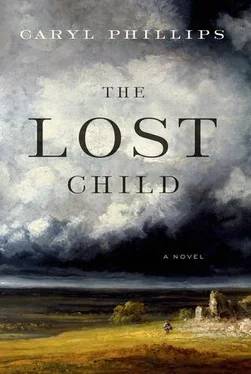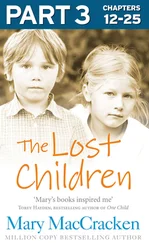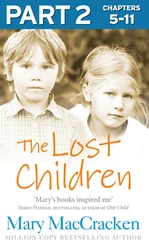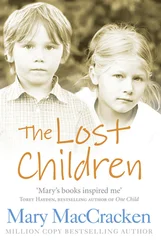When I came back that afternoon, Mam was sitting on the settee and two uniformed coppers were in the house. The woman one was sitting next to Mam and comforting her, and the bloke was standing up like he owned the place. Mam looked up at me and said that the bloke copper wanted to have a word, and then she started to cry again. The copper took me into the kitchen, and we sat at the table. He asked me if I was yearning for anything to eat, and I wanted to tell him that all we had was spaghetti hoops and toast, but I didn’t say anything, and I just shook my head. Then he started to ask me about Tommy’s friends, and if I’d noticed anything different about him in the past few days, and all sorts of stuff. No, I said. He seemed just the same, although he was a bit upset about having to play for Scott Hall Juniors, but who could blame him? I suppose he had kind of stopped talking, but I told the copper that this not talking lark went all the way back to Silverdale, where he’d had a particularly tough time. Did he make friends there? I shrugged my shoulders. How should I know, we were in different dormitories. But I didn’t say this. And these days, was he the kind of boy who liked to comb his hair differently once he’d left the flat? He got me with that one. Why would our Tommy want to do that? Then the woman copper came into the kitchen and said that I’d have to stay with social services for a day or two, as my mother had to go into hospital for a checkup. Then there was a knock on the front door, and the woman copper opened it and let in two ambulance men carrying a stretcher. She showed the pair of them into the living room, and then she closed in the door to the kitchen. I knew that Mam would be mad if I barged my way in to see what was going on, so I just kept sitting where I was, and I tried hard not to cry. I used my tongue to wet my lips and stared down at the chequerboard pattern on the lino. The bloke copper put his hand on my shoulder. You’d best go and pack a bag, he said. They’ll soon be here for you.
In the end it was a charmless, bearded man in a social services van who picked me up. The ambulance had long gone, and they’d waited until I was in my room before slipping Mam out of the front door, so I wouldn’t see her leaving. The woman copper went with her, and that left just me and the bloke copper waiting for social services. When the bearded man arrived and I stepped outside and looked over the balcony and saw “Social Services” scrawled in big letters on the side of his van, I was embarrassed, for I knew that everyone on the estate would know that I was going into care. I sat in the front of the van and didn’t even bother asking the man where he was taking me. When he pulled up outside of the big detached house on the corner of Manston Drive, I thought to myself: I pass this place every day on the bus, and I can see right into the garden from the top deck. It’s about halfway to town, so if I end up having to stay here, then my journey to school will take only fifteen minutes, plus the ten minutes walking through the market and the arcades. After he’d yanked up the hand brake, the social services man turned to face me and spoke for the first time. I’m not sure if this is an appropriate use of public resources, but it’s not up to me. But I can tell you, the Gilpins are a nice family, so do us all a favour and try to behave yourself. I didn’t say anything to him, but I’m sure he could tell what I was thinking by the way I was glowering at him. So he changed his tune. Well, come on then, let’s be having you. We don’t want to keep them waiting.
The Gilpins had two girls, Helen and Louise, who were a bit younger than me, and they both were kind of chunky and giggled too much for my liking. Their mother put on an educated voice and made some halfhearted effort to introduce me to her daughters, but I could see straight off that her whole life revolved around pleasing the two girls. Her husband, on the other hand, wanted to make friends, which was the wrong way to go about things. Maybe he’d been dying for a son or something, but I sensed that he was trying too hard. The social worker bloke said so long then, and shook hands with Mr. Gilpin, and then Mrs. Gilpin showed him to the door. The moron pretty much just dropped me off there like he was some kind of taxi driver and then he left, and that was it.
The two girls were going off to bed, so Mr. Gilpin took me into the kitchen and made us both a ham sandwich, and then he offered me a cup of stewed tea, which, after one sip, I had to leave as I knew I couldn’t stomach it. He asked me if I liked the Olympics, and I said I did. We took our sandwiches and sat in front of the telly on this really large, comfy settee, and we watched Kip Keino win the steeplechase. David Coleman was commentating and talking really fast, and I looked across at Mr. Gilpin, who kept nodding, and then smiling at me, and then looking back at the telly and nodding some more. I could tell that he also liked the Olympics, but I was now wondering about his clothes, for he had on fur-lined slippers, suit trousers with a crease, and a ratty-looking cardigan over a shirt with a grubby collar, all of which made him look about ten years older than he probably was. When his wife came in, he quickly got up and turned the volume down a bit. Mrs. Gilpin didn’t say anything, she just pulled the curtains, and then sat down and watched for a while, but you could tell that she wasn’t really following what was going on. Eventually she smiled at me and said, chop-chop, isn’t it about time for bed now? I didn’t stand up. Well, come on. Let’s not be having a falling-out about it. I wanted to remind her that we’d only just started back after the summer holidays. Hadn’t she ever heard of Alice Cooper? “School’s Out,” missus. It’s on the radio every day, and it still feels like the holidays, so why was this woman being so stroppy?
I rolled from one side of the bed to the other side, then back again, and realized that it was the sheets that were making me feel funny, for they were clingy and made an odd scratching noise when I moved about, like somebody needed to oil them. And then I remembered: the bag of newspapers would still be sitting next to the fence by the church. Tomorrow I’d have to go and tell the newsagent that he’d have to get somebody else. I wondered if I’d ever see the inside of our flat again, but I had a feeling that I might not. Of course, nobody explained anything to me: not the copper, not the social worker, not even Mr. Gilpin, although it’s possible that he was in the dark like me. I stared out of the window at the stars and wondered again about our Tommy. Where was he? Why wasn’t anybody telling me what was up with him? I wasn’t some kid, I was fourteen, and whichever way you looked at it, I had a right to know.
“Rock and Roll” (Parts 1 and 2) — Gary Glitter
After nearly a week at the Gilpins’, I went to see Mam in hospital, and I found her sitting by herself in a big room full of plastic chairs. She was staring out of the window like she was in her own world, and she didn’t even shift herself to turn around when I walked in, even though I know she must have heard me as my trainers made this horrible high-pitched squeal whenever they rubbed against a wooden floor. Mr. Gilpin pointed at her as though he reckoned he was helping me out, and then he whispered that he’d wait outside for me in the car. By now I knew that he’d have happily moved lock, stock, and barrel into his Austin Maxi if it meant he’d be able to get away from his wife and two roly-poly kids. After all, I was pretty sure that he cared more for the car than he did for them, and maybe fostering me was his way of finding somebody to talk to, for the three of them pretty much ignored him. I walked over to Mam and sat in the chair opposite her and said hello, all the while trying to hide the fact that the place was making me feel all queasy inside. She looked directly at me, and as she recognized me, a kind of tired smile spread over her face. I’m sorry, she said. I suppose I should have kept a closer watch on both of you. Will you forgive me? She looked like all the life had been knocked out of her, and I wanted to say that it wasn’t her fault, but I just couldn’t get the words out. When I think about it now, I’m convinced that they must have had her drugged up on all sorts of medicine, but to me she just seemed like she was half asleep and not really making much of an effort to stay awake, and I wondered how long it was going to be before I could get back to Mr. Gilpin’s car. However, I knew I had to make the visit last a bit longer or it would be rude, but I didn’t have a clue what to say, and I knew that she wasn’t going to ask me anything about what I was up to. And so we sat together for nearly an hour, me itching to get up and leave and Mam with that vacant look on her face, and neither one of us able to talk about what had happened to my brother.
Читать дальше












